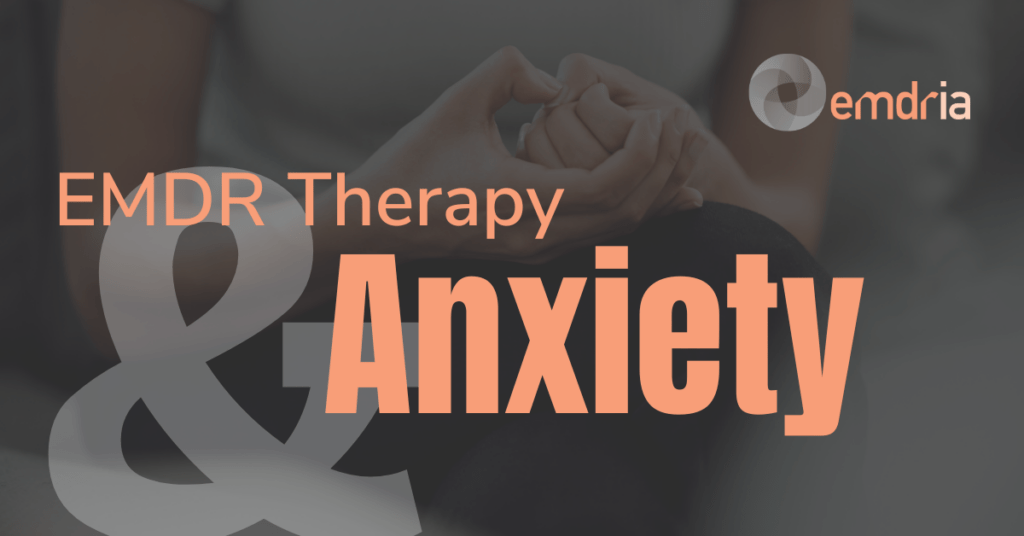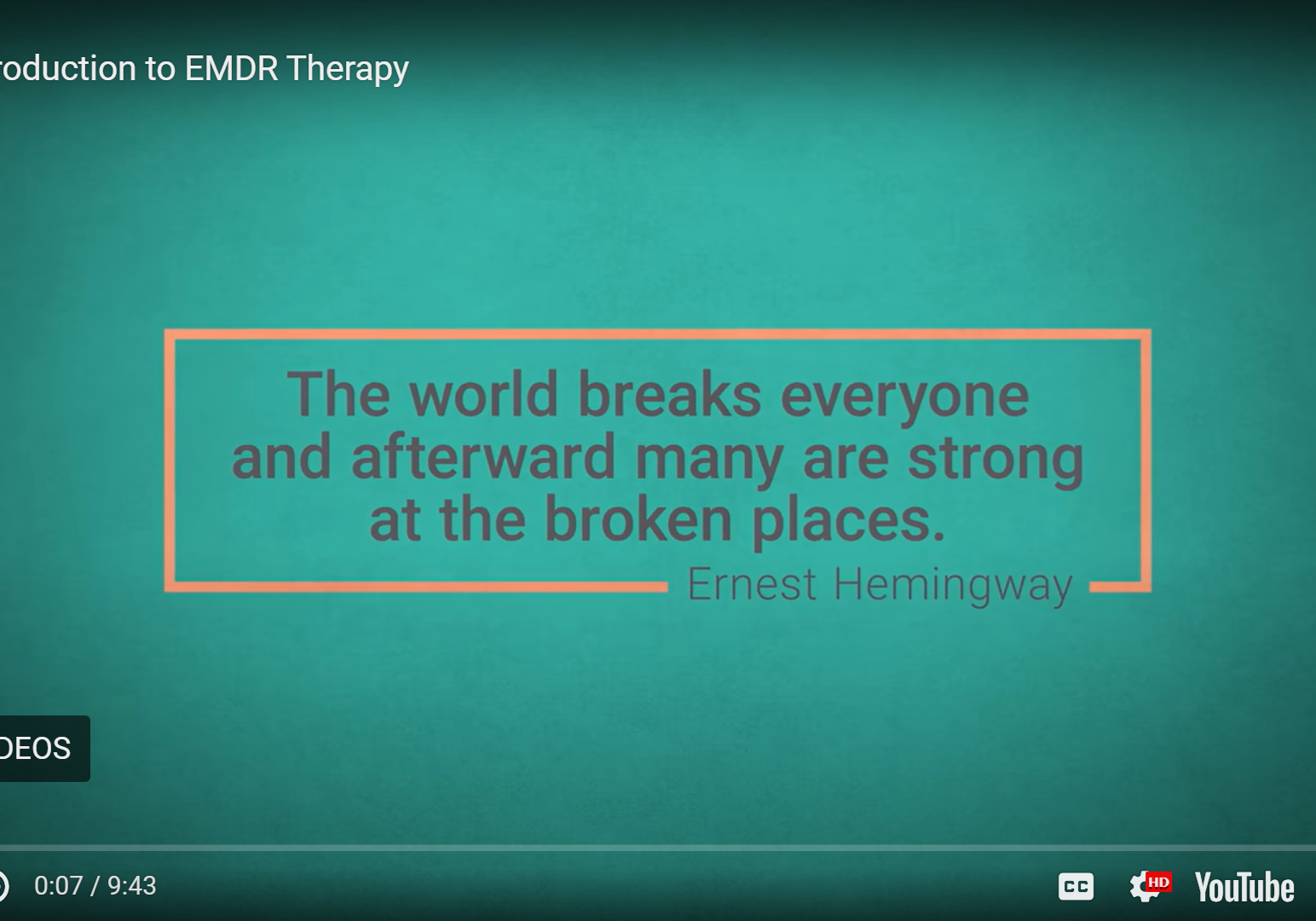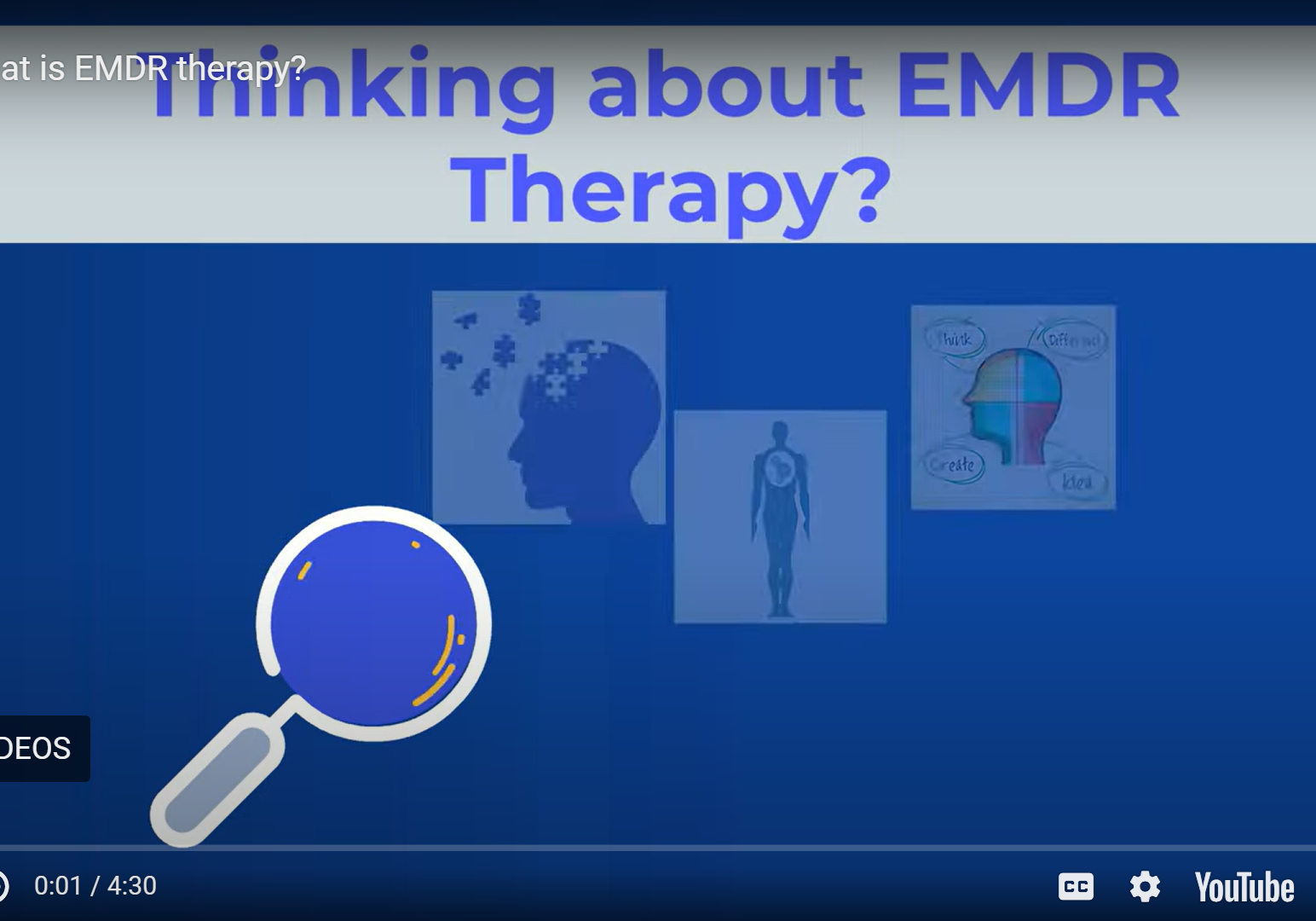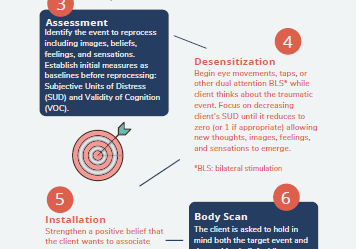Can EMDR therapy help with anxiety?
Yes! Learn how you can experience relief with EMDR therapy.
What is anxiety?
When we experience anxiety, we experience an uneasiness about a danger in our future, whether that future is within five minutes or fifty years away. Sometimes the nature of the danger is noticeably clear, such as when we are about to take a test. Other times the sense of fear and dread appears “out of the blue,” with no apparent cause at all. Symptoms such as a rapid heartbeat, sweating, and the tingling sensation in our muscles are the result of our nervous system preparing us to either fight, run away from, or freeze in response to the danger.
The body’s preparation to deal with danger is useful if we are crossing the street and suddenly need to get out of the way of an oncoming bus. If, however, we are sitting on the sofa watching TV and suddenly our heart starts to pound, we get sick to our stomachs and feel dizzy, it can be a terrifying experience in a quite different way. In this example, there is no oncoming bus to point to as the source of danger. However, perceived danger can have the same impact as imminent danger. Sometimes people become afraid of the symptoms themselves and have thoughts such as, “what if I am having a heart attack?” or “what if I am going crazy?”
The experience of anxiety is common to all people and can be motivating in certain circumstances such as preparing for a presentation or studying for a test. In other circumstances, however, anxiety is overwhelming and can interfere with one’s daily functioning. For many people with anxiety disorders, the effects of anxiety are debilitating. There are several different anxiety disorders that impair people in various ways including panic disorder (fear of having panic attacks), agoraphobia (avoidance of places where panic may occur and escape may not be easy), generalized anxiety disorder (persistent and excessive anxiety and worry), social anxiety disorder (occurs in social situations where one may be judged by others), and obsessive-compulsive disorder (irrational worries are managed via rituals).
While the cause and experience of anxiety varies, people suffering from it tend to overestimate the level of danger present and underestimate their ability to cope with it (Beck, Emery, Greenberg, 1985). One way this tendency can develop is from the way that past experiences were processed and are currently stored in the brain. When past distressing experiences remain unprocessed and are not integrated into adaptive beliefs, then we tend to have problems in our current functioning in the world. Anxiety can be one of those problems.

How can anxiety affect your life?
You may experience overwhelming physical sensations such as rapid heartbeat, difficulty breathing, dizziness, upset stomach, tingling in your muscles, or hot flashes/chills. You might find yourself avoiding places, situations, or people out of fear of having anxiety or panic.
Some people find themselves worrying constantly about everything. Other people find themselves replaying conversations they had in a social situation repeatedly, worrying that they said something that others will judge negatively. You might find yourself in a ‘fog” state, where you have trouble listening and comprehending what others are saying.
It is common that people with anxiety disorders feel irritable, restless, and experience sleeping problems. Those symptoms might interfere with their ability to attend school and perform well at work. Relationships often suffer. If left untreated, sometimes the symptoms disappear for a while and then reappear later.

How can Eye Movement Desensitization and Reprocessing (EMDR) therapy help you overcome your anxiety?
If anxiety is our body’s warning system that danger is present, then it is helpful to figure out what the danger is and then address it with EMDR therapy (Fee, 2018). You and your EMDR therapist can put on your “detective hats” to figure out the source of your anxiety. Anxiety can be tied to past events, current situations, or future scenarios. The source of your anxiety is likely to be the focus of your EMDR therapy. EMDR therapy can be used alone or with other approaches to resolve your anxiety and achieve your goals.
EMDR is an eight-phase psychotherapy approach that helps you tie current symptoms to negative beliefs and unresolved stressful events that have fueled and strengthened those beliefs. Depending on the nature of your anxiety your therapist might help you address panic attacks, phobias, or OCD symptoms directly, or you might work on an unresolved stressful event from your past. Regardless of your treatment plan, EMDR therapists will be mindful of how your culture and personal context impact you and your experience with anxiety. They will build a strong working relationship with you and help you develop tools for coping with how you are feeling currently. The therapist will assess your readiness for EMDR reprocessing and move at a pace that works for you.
If for example you process a past event that is fueling your current anxiety, your therapist will ask important questions about the event including your thoughts, feelings, body sensations, and images. Once you start reprocessing, you will start thinking about the event and follow movement with your eyes (or alternatively hold tappers in your hands or self-tap or listen to tones). During the process you will notice what happens with your body, thoughts, and feelings without judging them or just trying to change them. You just go with what comes up and notice how it changes over the course of the reprocessing sessions. While at the beginning people rarely believe that how they feel can ever change, EMDR does help people process through painful memories so that they are no longer stored in that raw, vivid, state specific form. At the same time, EMDR tackles negative beliefs such as “I am not in control,” “I am in danger,” or “I am weak.” Processing results in the strengthening of alternative beliefs such as, “I am capable,” “I can handle it,” and “I can be myself.”
EMDR reprocessing takes a number of sessions, and your therapist will help you to return to a calm place at the end of each session and talk to you about how to “close” down the work until your next session. It is important to communicate with your therapist about your needs, triggers, and hopes so they can help you with their supportive presence to stay grounded and present during the reprocessing process.

What are clients saying about EMDR therapy for anxiety?
“EMDR worked for me. I just took a trip and was able to do fun things I had not done in years due to anxiety.”
—Evan, age 45
“My father has triggered my anxiety with his anger ever since I was a little kid. Last night he was quick to anger, and I just looked at him and said, ‘I don’t see why you’re so upset.’ He had no response, and I had no anxiety. I had EMDR therapy about two years ago, and I am still grateful every time I have a victory.”
—Susanna, age 57
“For me, the experience of panic attacks was the worst thing that ever happened to me. I was afraid to do EMDR therapy and think about past panic attacks. My therapist assured me that I was in control. I am still really surprised that those experiences don’t bother me anymore and that I don’t worry about having another panic attack.”
—Desiree, age 28
“I didn’t think my experience of being bullied in middle school was affecting me at all as an adult. I had no idea why a certain co-worker triggered my anxiety; I just knew I was avoiding him at all costs. I knew I experienced a great deal of healing when I waved to my coworker from across the parking lot the other day and felt no anxiety at all!”
—Paul, age 32

What questions can you ask your EMDR therapist about using EMDR for anxiety?
- What can I expect from EMDR therapy?
- How does EMDR help anxiety?
- What is your training and experience using EMDR for anxiety symptoms?
- Can EMDR make anxiety worse? What will we do if I start to feel overwhelmed?
- I don’t think my anxiety is linked to any trauma. How would we use EMDR?

What's the next step?
Find an EMDR Therapist® in Your Area
The EMDRIA™ Find an EMDR Therapist® directory is an up-to-date resource to find EMDRIA™ members providing EMDR therapy in your area. The directory includes searches by location, name, and other criteria.
Want to learn more about EMDR therapy?
Do you ever feel like your anxiety is trying to tell you something? Rather than ignore these feelings, Dr. Jennifer L. Fee tells us we should embrace anxiety and listen to what message it has to share.
Introduction to EMDR Therapy
In this video, learn what it’s like to experience EMDR therapy and how the therapy is widely recognized by trusted organizations.
Thinking about EMDR Therapy?
What does EMDR therapy look like? This short video for clients explains the 8 Phases of EMDR Therapy and what they might experience in EMDR therapy sessions.
8 Phases of EMDR Therapy Infographic
Discover the 8 phases of EMDR Therapy to treat traumatic events. From history and treatment plan to reevaluation and more.

Citations
Beck, A. T., Emery, G., & Greenberg, R. L. (2005). Anxiety disorders and phobias: A cognitive perspective. Basic Books/Hachette Book Group.
de Jongh, A., & ten Broeke, E. (2009). EMDR and the anxiety disorders: Exploring the current status. Journal of EMDR Practice and Research, 3(3), 133-140. Open access: https://dx.doi.org/10.1891/1933-3196.3.3.133
Faretta, E., & Dal Farra, M. (2019). Efficacy of EMDR therapy for anxiety disorders. Journal of EMDR Practice and Research, 13(4), 325-332. Open access: https://dx.doi.org/10.1891/1933-3196.13.4.325
Fee, J. (2018, October). Anxiety is the messenger [Video]. TEDxCSULB. YouTube. https://www.youtube.com/watch?v=JoDe1Blxb8s
Shapiro, F. (1999). Eye movement desensitization and reprocessing (EMDR) and the anxiety disorders: Clinical and research implications of an integrated psychotherapy treatment. Journal of Anxiety disorders, 13(1-2), 35-67.
Yunitri, N., Kao, C-C., Chu, H., Voss, J., Chiu, H-L., Liu, D., Shen, S-T. H., Change, P-C., Kang, X. L., & Chour, K-R. (2020). The effectiveness of eye movement desensitization and reprocessing toward anxiety disorder: A meta-analysis of randomized controlled trials. Journal of Psychiatric Research, 123(1), 102-113. https://doi.org/10.1016/j.jpsychires.2020.01.005
More Resources
Find more anxiety resources in the EMDRIA™ Library.
Special thanks to our members April Twenhafel, LMFT, Brent Scarborough, LMFT, and Dr. Audrey Seaton-Bacon for their invaluable feedback regarding this page.






